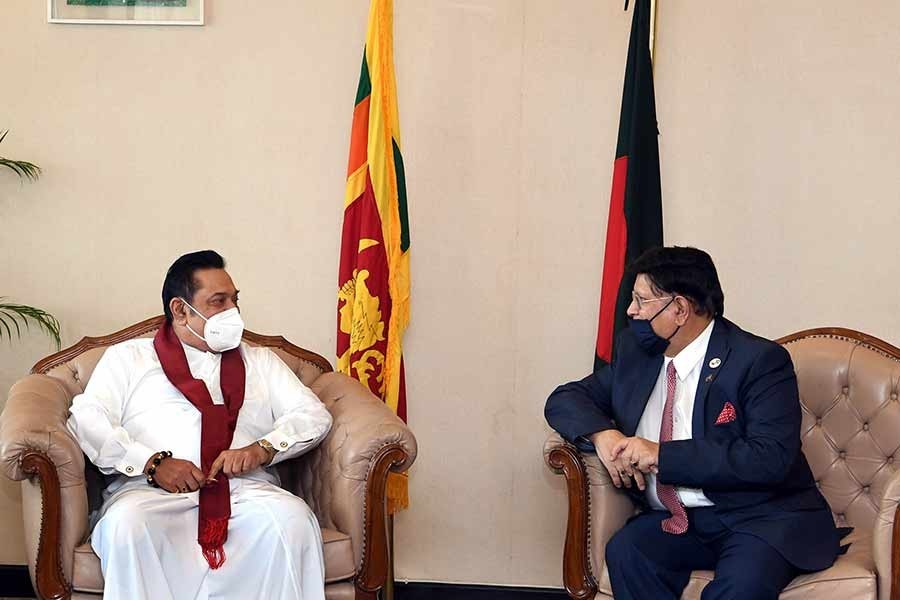Something incredible is happening. Bangladesh has decided to lend $200 million to Sri Lanka under a currency swap deal. The lending decision has caused many to raise their eyebrows, at least, for a couple of reasons. The first reason is the poor credit rating of the borrower - Sri Lanka - and the second one is the reserve inadequacy to entertain such lending.
The issue that Bangladesh itself regularly receives external aid for its development and, on occasions, budgetary support does not come into play since some countries having stable and big volume of reserves do, at times, make such currency swap deals.
The lending decision, it seems, has been taken under diplomatic consideration.
Sri Lanka, at the moment, has a very low reserve of $4.4 billion. It has a debt repayment schedule of $4.05 billion this year. So, the country is now in deep crisis as far as its foreign reserve is concerned.
In contrast, Bangladesh has a healthy reserve of about $44 billion. The amount is enough to meet import payments for more than nine months. Since there has been a marked decline in imports in recent months, the reserve could meet import demand for more months.
Bangladesh, according to media reports, has decided to lend fund to Sri Lanka under the currency swap deal following a request made by Sri Lankan Prime Minister Mahinda Rajapaksa to its Prime Minister Sheikh Hasina.
None would surely raise a question about Bangladesh's ability to offer such a loan that is backed by a sovereign guarantee. Its economy has been doing better than any of the regional countries even during the pandemic. It was the fastest growing economy in 2020 in South Asia. The country's per capita income has just surpassed India's.
There is no denying that the credit rating of Sri Lanka, at the moment, is low and the central bank's investment guideline discourages this kind of risky investment.
India has in place a credit swap framework for SAARC countries under which the Reserve Bank of India (RBI) can strike a bilateral agreement and extend short-term help.
Many might be wondering why Sri Lanka has not approached India which has a framework to offer such help. Why Bangladesh?
According to a report published in The Indian Express, Colombo had approached for such help, but New Delhi preferred to ignore it. The Sri Lankan President, reportedly, had approached Indian Prime Minister Narendra Modi seeking a $1.0 billion credit swap and moratorium on repayment of debts to India.
Not that India did not help Sri Lanka. The RBI, under a currency swap deal, provided Sri Lanka $400 million in July last year. Colombo repaid the amount with interest in February last. But the facility was not extended for the second time.
So, the reason/s for India not responding to Sri Lanka's request for help might be something else. It is believed that Lankan refusal to accept a container terminal project at Colombo port has soured relations between the two countries.
It is no secret that China plays a dominating role over Sri Lanka and India takes exception to such dominance.
So, it seems natural on the part of Sri Lanka to seek financial help from China at the time of its financial distress, caused by a significant drop in earnings from tourism and readymade garments and tea exports in recent times.
But there exist some problems on that front also. Sri Lanka, reportedly, is in deep debt, an estimated $5.0 billion, to China. Besides, the latter gave a $1.5 billion currency swap facility, in addition to a loan of $1.0 billion given as a loan last year.
China is the world's second-largest economy and it has got huge clout in the world economy. Under Belt and Road Initiative (BRI), it has been offering development assistance worth billions of dollar in Asia and Africa. Bangladesh is also a BRI beneficiary.
India is also one of the major economies of the world, but its reach is well short of China's. It, however, exercises particular influence in the South Asia region, economic or otherwise. For geopolitical reasons, China and India have emerged as rivals in the matters of wooing the South Asian countries to their respective folds. Bangladesh has been trying hard to maintain a balance. Whether it has been able to do that, however, remains a matter of scrutiny.
Among the SAARC countries, India has the largest economic base. The RBI has a credit swap framework under which it could extent funds up to $2.0 billion to smaller SAARC member countries to meet their short-term need.
None has ever thought that any SAARC country other than India would ever extend a similar credit swap. Though Bangladesh's sole intention is to help Sri Lanka in a difficult time, the development is being seen as a landmark one.


